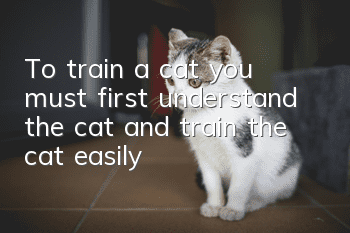To train a cat, you must first understand the cat and train the cat easily!

Cats
Cats will make some small mistakes or bad habits in their lives. This requires unremitting training from the owner in the future to make the cat well-behaved. Cats are notoriously sensitive and timid. Animals, so training cats must start with understanding cats. As the saying goes, only by knowing yourself and the enemy can you win every battle. Understanding cats will be very useful for training cats. To train a cat, you must first understand the cat and train the cat easily!
1. Do not beat or scold to build trust
Cats may indeed like to have their own little secrets, as long as It's harmless and the owner doesn't need to pay attention to it (this does not include taking back dead animals from outside and hiding them in nooks and crannies of the home, quietly scratching a corner of the owner's favorite coat, or fishing out small fish from the tank while the owner is not at home). ...), just like we ourselves also have privacy that needs to be protected, cats don’t like and are unwilling to explain everything to their owners. Besides, this is technically difficult to operate, so don’t expect “cat talk” Apps like this can become your translator. Too many people who have used it said that their cats were frightened after sentences expressing love were "translated" and conveyed by it.
As an owner, what you need to master and be proficient in is to maintain effective communication with your cat, provide it with the help it needs, let it feel your love, and when it does something wrong, Able to give kind reminders and corrections. All communication must be friendly, including reprimands, and keeping the right tone is key. For example, you just need to let it know that you don't like something it does, and you should stop and reprimand it in time when the thing is going on. Stop it as soon as you point it out, and never resort to violence. One of the differences between cats and dogs is that the saying "filial sons come out of the stick" may apply to some dogs, but for cats, once they are punished corporally, they will lose trust in humans out of fear. And lead to personality changes, and it may also engage in more drastic behavior out of self-protection.
When we do something wrong without knowing it, we always hope to be understood and treated kindly, let alone a sensitive cat? Becoming someone they can trust and trust is the first step we need to take. Only by establishing trust can communication and training be possible.
2. Combining rewards and punishments with standardized training language
So, does a cat need to be friendly or even give snacks to show consideration when it does something wrong? Big mistake, friendly treatment includes the elimination of violence, including no corporal punishment, but it does not mean you should be praised or even rewarded for doing wrong things. Don’t overdo it. Pampering is also not good for cats, unless you want your cat to become your big boss. And be able to obey its instructions. Otherwise, when the cat does something wrong, please reprimand and correct it in time.
Cats and humans are not in the same discourse system and behavioral norms. They have no concept of what they can and cannot do. Like scratching your beloved expensive leather sofa, to them it is probably just a small game or mid-day exploration. If you catch them doing damage while they are in progress, please stop and reprimand them in time. But if you only discover the "good thing" it did after the fact, please suppress your anger, pretend nothing happened, and quietly clean up the scene. Because the cat has long forgotten what it has done, if you reprimand it now, it will be unreasonable in its view, "The owner likes to lose his temper so much, it's really inexplicable." You must catch the current situation, and you will never reprimand when it is not "committing a crime". If you still can't catch the current situation, the owner might as well regard this as a small endurance exercise.
It is best to choose reprimanding words with pronunciations that are easy to recognize and remember, such as "No" and "No". It is best for family members to use the same words for reprimanding cats. Don't use "No" as you are used to it. , my sister likes to say "no", my mother will say "look what you did!" and my father will say "stop"... This will make the cat very confused, "What is the situation? What does this family want to say?" Select Decide on one or two words and raise the volume appropriately. The cat will soon understand what you mean and stop the wrong behavior.
When training, you also need to pay attention to the combination of rewards and punishments, and the focus should be on rewards. The reward can be a few words of praise or snacks. Generally speaking, the former is the mainstay and the latter is supplementary. The same reward words should be limited to two or three to avoid disturbing the cat, such as "good" and "awesome", and try to say them in a gentle and approving tone. Cats are as sensitive to praise as they are to punishment. Whenever they do something right, they will be praised immediately. Over time, they will form fixed behavioral habits. And pay attention to praise as much as possible and scold as little as possible. The length of this process varies according to the different personalities of different cats. However, as long as you have a winning heart and are full of love, training a "Five Good Model Domestic Cat" is not a dream.
3. The quality of training a cat has its own reasons.
It took a while after you got home to find that you didn’t see the cat? After searching around, I found that it had hidden in the closet or under the bed, refusing to come out, and even "meowing" in displeasure when it saw you? What was your first reaction at this time? First, do a surprise inspection at home to see if she has done anything wrong? Did you break a vase or scratch the sofa?
Stop. If it's a dog that hides and whimpers when you come home, you really need to check if it has made a mistake, but this situation may not apply to cats. If your cat hides or expresses dissatisfaction when seeing you, it is likely that the problem lies directly with you. Don't rush to defend yourself. This "problem" may not be worth mentioning in the eyes of humans, but it is quite serious for sensitive cats. For example, if you invite a group of friends to your home, the noise and the smell of strangers may cause discomfort to the cat, causing it to resist and hide itself. Or maybe you just went to get a haircut, and the cat was so frightened that he ran away when he saw you. The reason may be:It may not be your new hair style, but the smell of the chemicals used to do it may make your cat uncomfortable, so run away to avoid smelling it. Although dogs do all the work of anti-drug search and rescue, cats’ noses are no less sensitive. They can quickly identify any unfamiliar, pungent, or unpleasant smells and take timely action: hide or run away. , or even protest. If a cat is found to be behaving abnormally, and after eliminating physical factors, it is necessary to find out the cause of the abnormal behavior. Simply reprimanding and correcting it is meaningless, because "the person who untied the bell must tie the bell."
4. Understand the language of cats
Cats will purr when they are happy or satisfied, and the purrs of different cats vary greatly. We can easily distinguish a grunt from a piercing roar. This roar is produced when fighting off an invading cat or dog.
Cats meow mainly to attract other people’s attention. If the meow is short and high-pitched, it means the cat is looking for its owner in the house. Cat training, if the meowing sound is long-lasting and loud, it means that the cat wants to open a door or wants to eat. Cats will make angry screams if they are kept in a travel basket or if their tail is stepped on. When a cat sits on the window sill and watches the birds outside, it will make a squeaking sound that is somewhere between a meow and a purr.
A cat’s body language is shown through its posture. Often you can use your intuition to determine what your cat is feeling and needs. A satisfied cat is most easily recognized because it is completely relaxed and has its eyes narrowed. When a cat is relaxed, it stretches its limbs and waves its paws. At this time, you can go up and scratch it gently, and it will lie on its back on the ground and let you continue to scratch it. Cats will also sometimes stomp and purr when satisfied. This is because he used to have to stamp out the milk when he nursed.
We often don’t understand the world of cats. They are not just for food and play. Cats are also very emotional animals. Many times they need the companionship and care of their owners. Maybe they do Those bad things are just trying to get your attention.
- How many hours should a cat normally sleep a day?
- What causes cats to poop and vomit?
- How to train a cat to use a scratching post
- Why does a male cat still ride a female cat after being neutered?
- Teach you how to walk a cat? Cat’s outdoor exercise: walking!
- How old do kittens need to be to survive on their own?
- What to do if your cat’s gums are red and swollen
- Are cats afraid of cucumbers? Are cats afraid of cucumbers?
- How to care for a cat with asthma?
- What medicine should I take if my cat has sticky drool?



